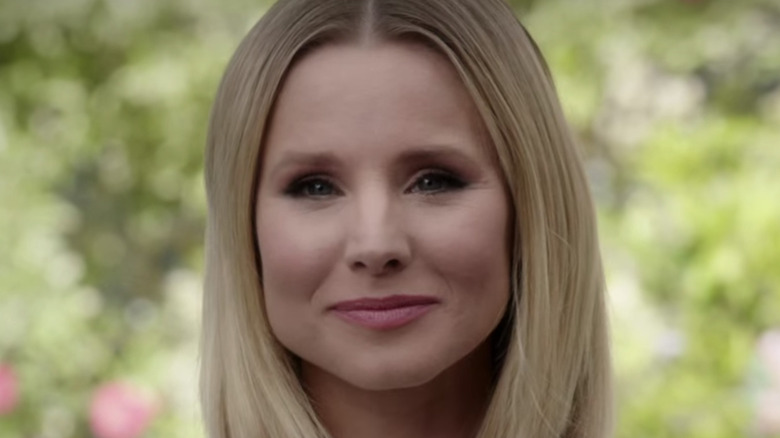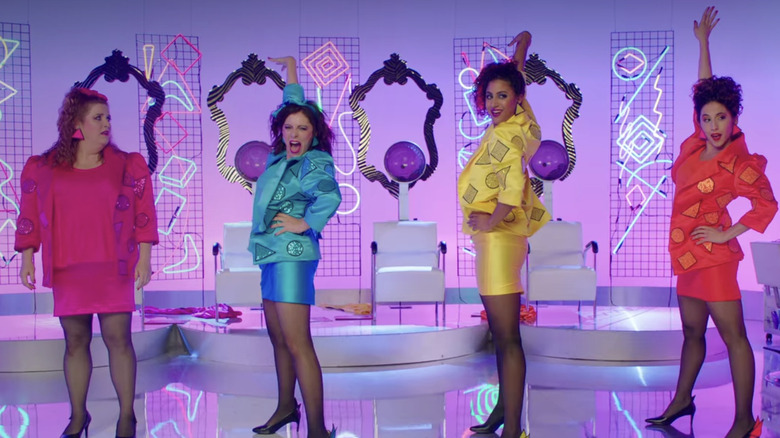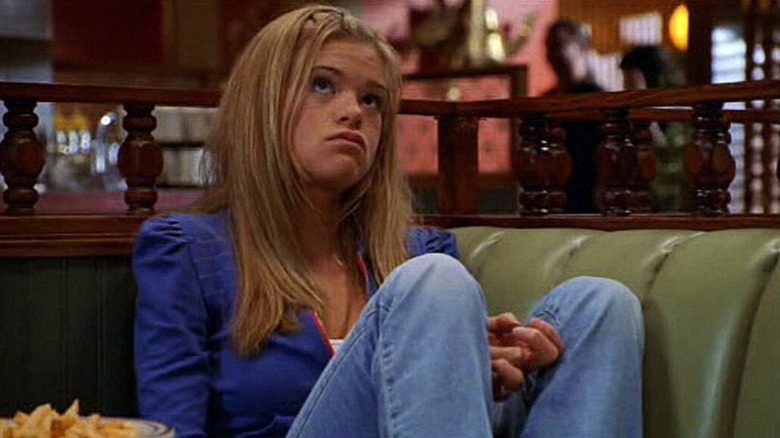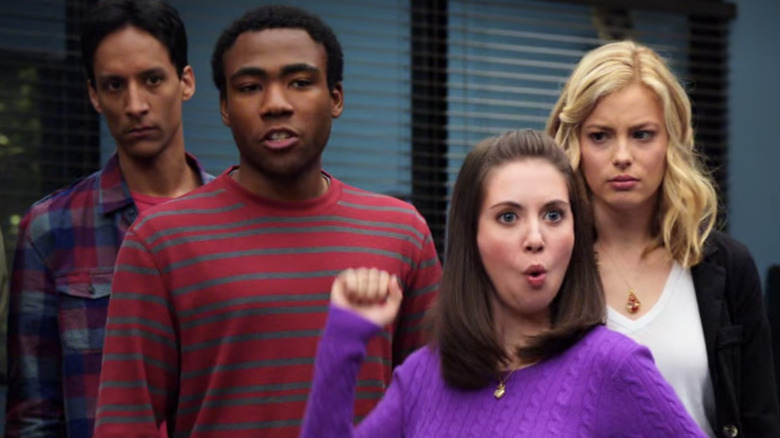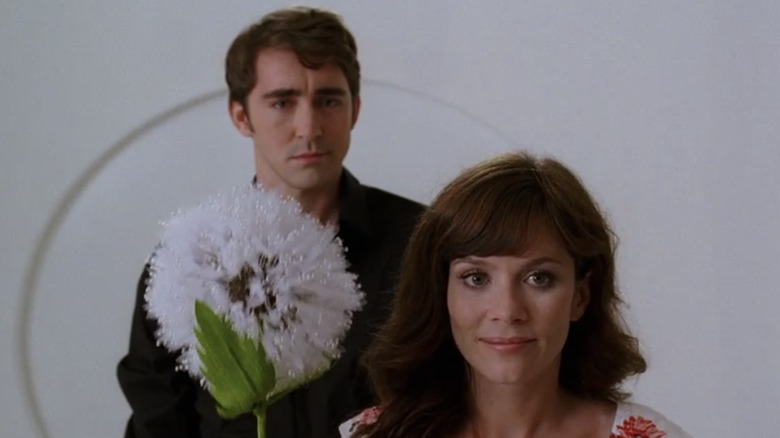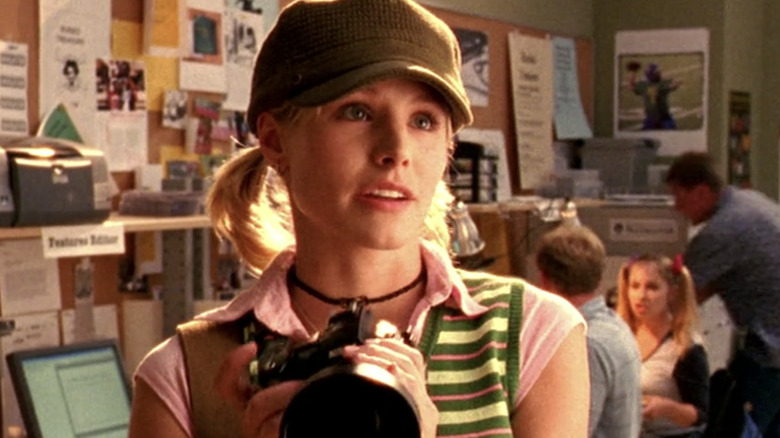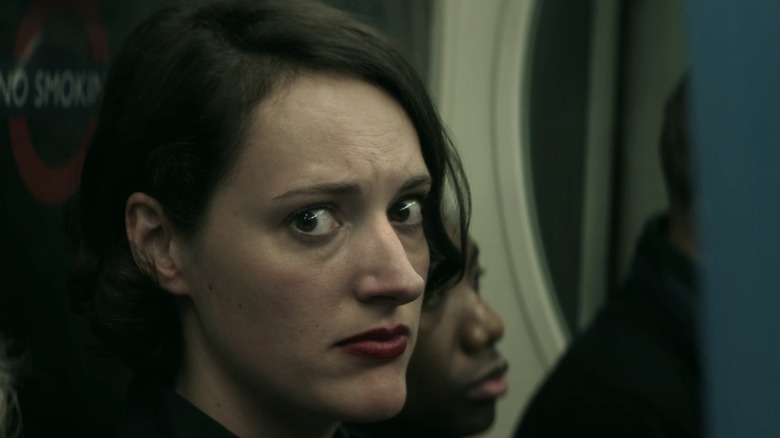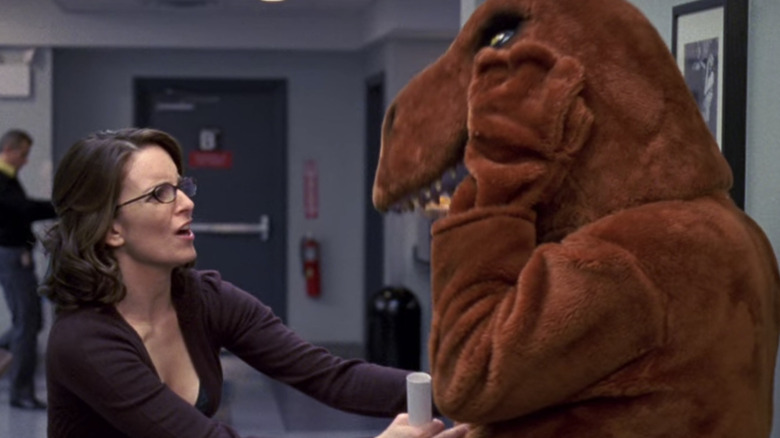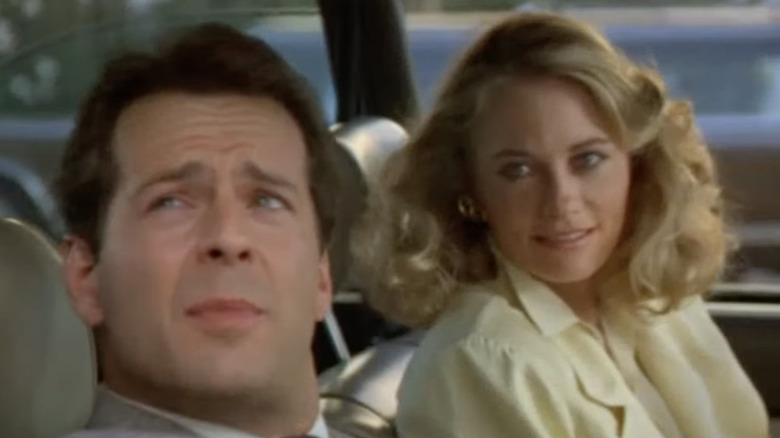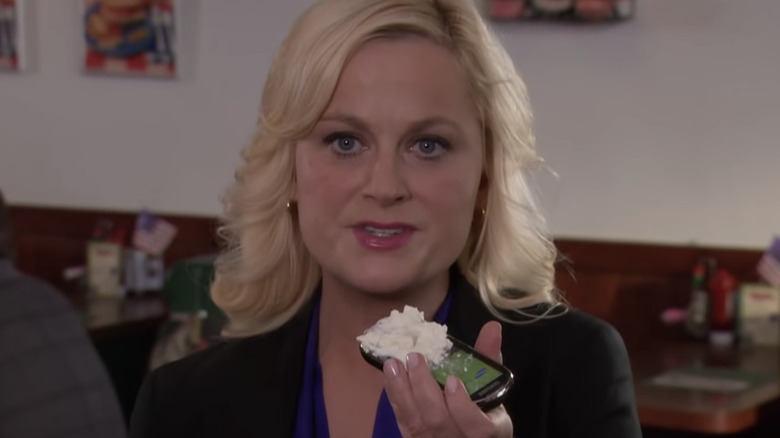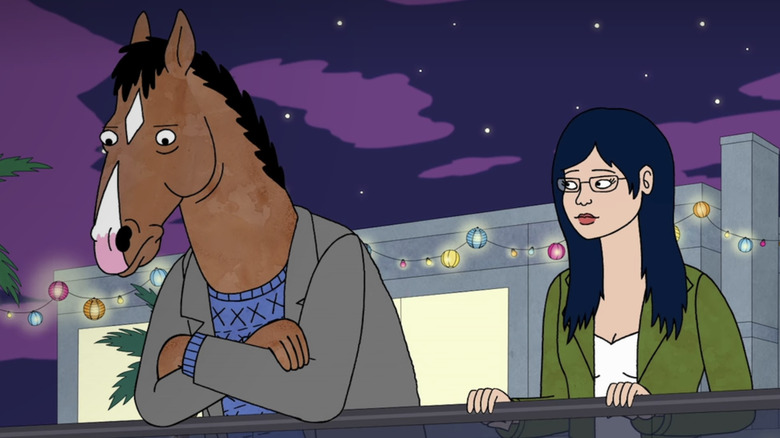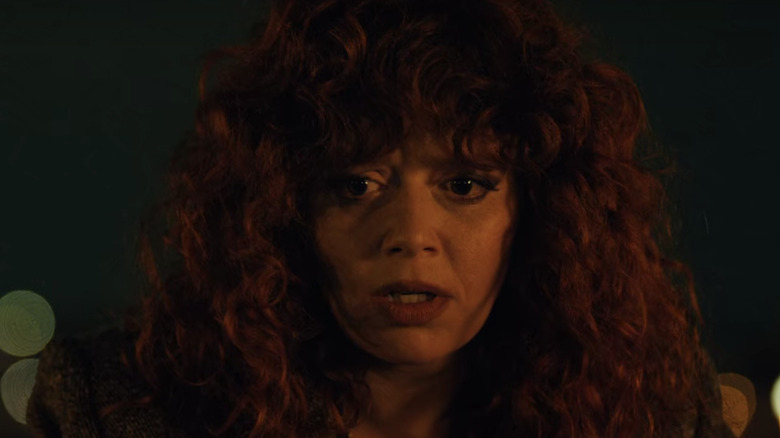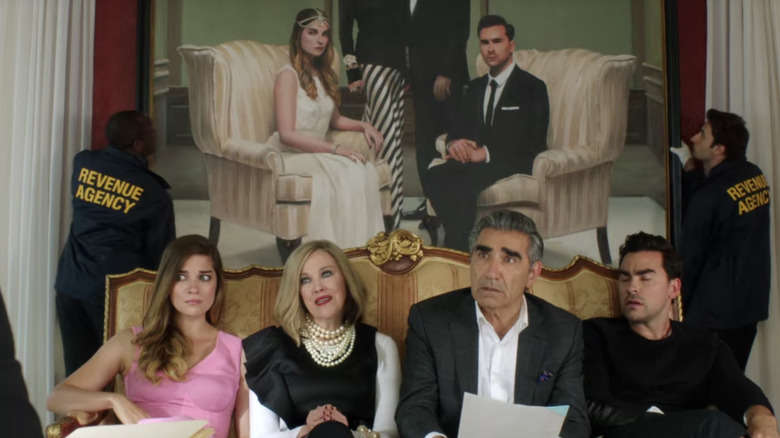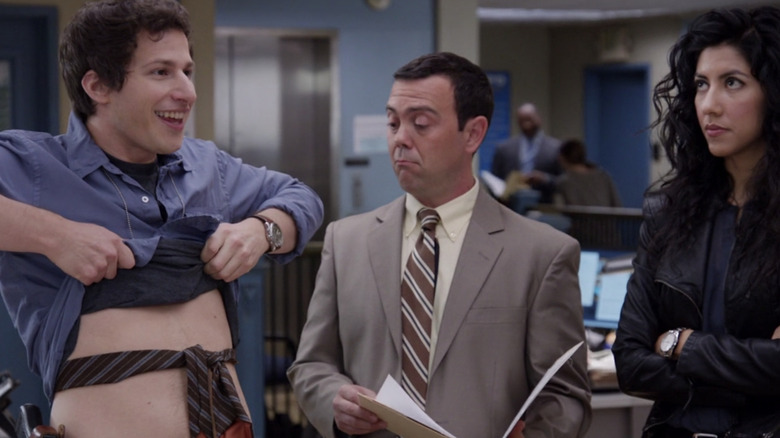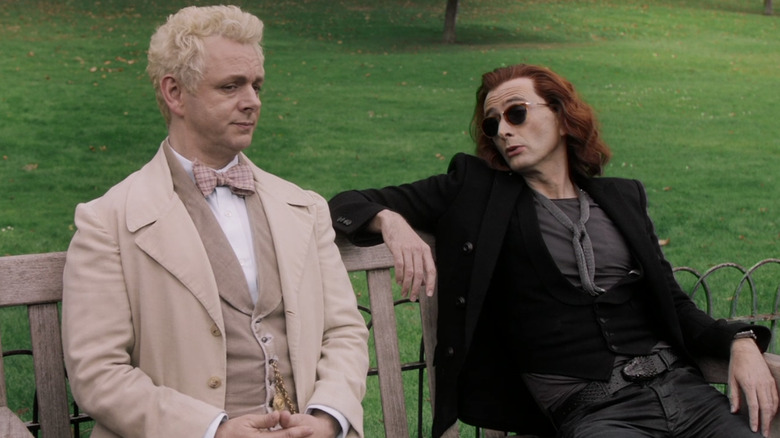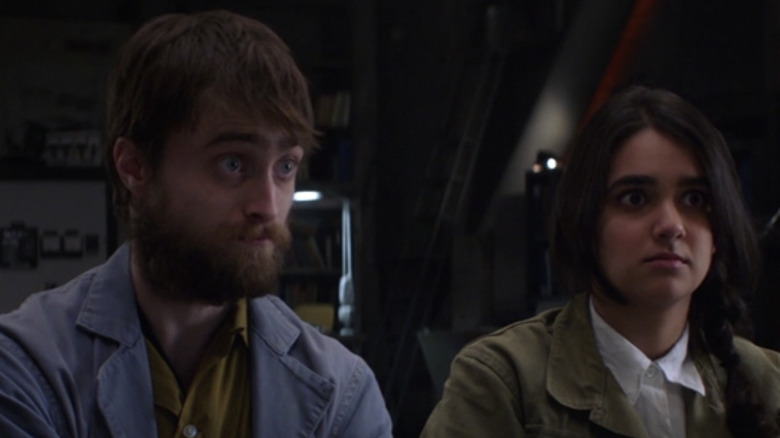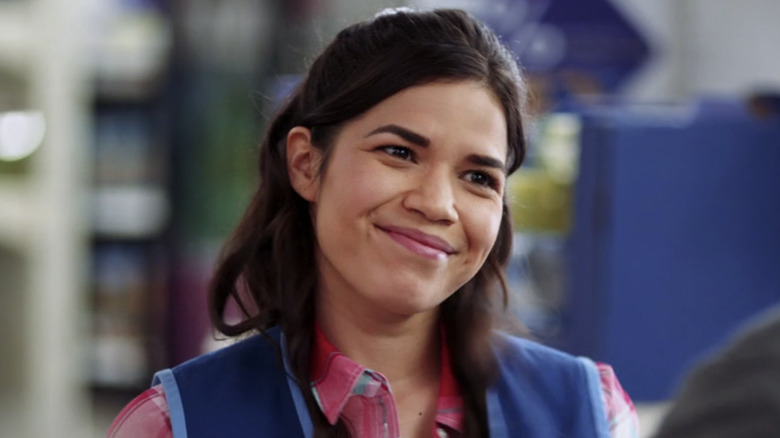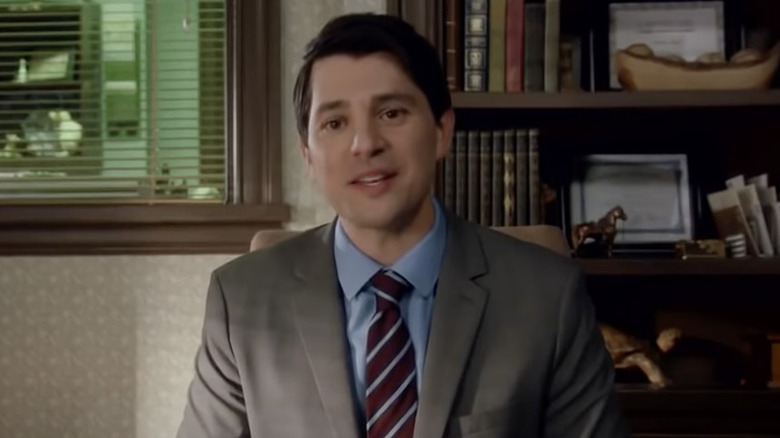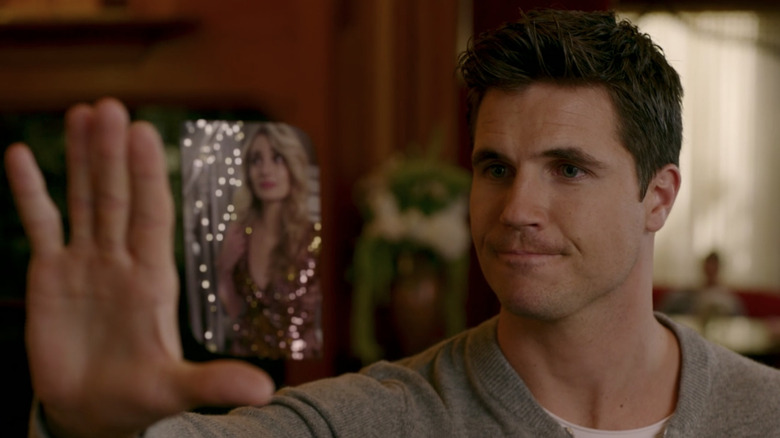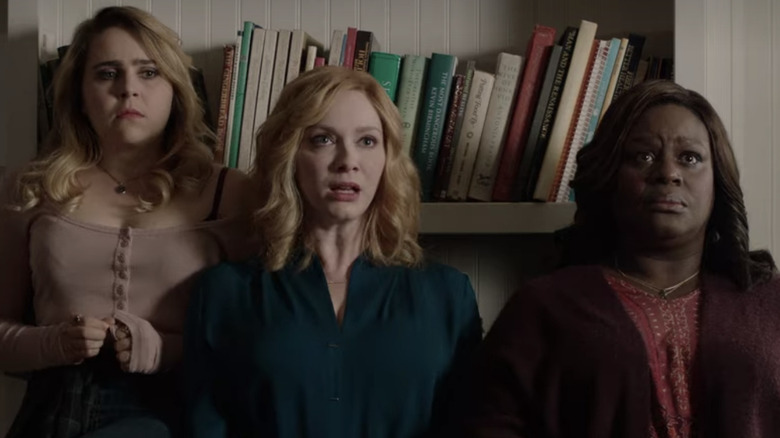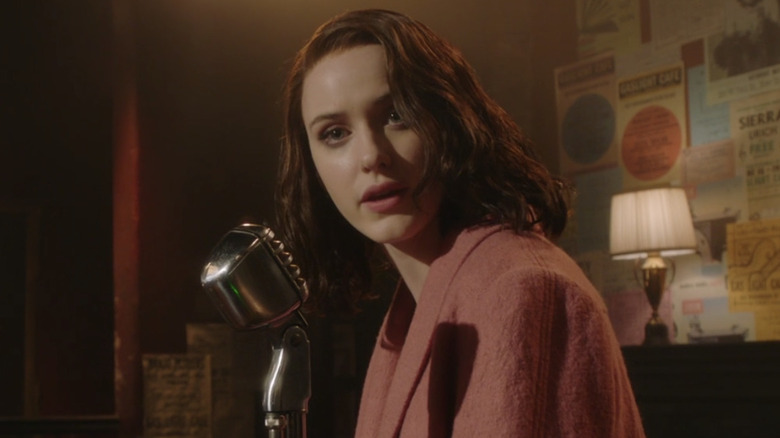20 Great Shows Like The Good Place That Are Worth Your Time
Michael Schur's "The Good Place" takes the central existential question that's plagued philosophers for centuries –- what does it mean to be "good?" –- and attempts to answer it in the form of a sitcom. Eleanor Shellstrop (Kristen Bell) is a person of questionable morals who's prone to cheating, light thievery, and calling people basic. When she's hit by a knock-off Viagra truck and sent to the afterlife, she winds up in the Good Place — a heaven-like utopia for morally upstanding folks. Eleanor knows she's in the wrong spot, so she decides to learn how to be a better person with the help of philosopher Chidi (William Jackson Harper). She also befriends Jason (Manny Jacinto), a dense criminal who also shouldn't be in the Good Place, and Tahani (Jameela Jamil), a self-centered philanthropist. Together, the four of them learn how to look both inside and out to find the goodness in themselves and others, all while discovering that their new surroundings aren't all that they seem.
While "The Good Place" follows many classic sitcom conventions –- friends who become like family, nonstop jokes, and even a leading performance from genre veteran Ted Danson -– the series stands out thanks to its philosophical and emotional depth. After all, how many sitcoms feature a moral philosopher as a main character or center around discussions of ethics? "The Good Place" explores questions of goodness, humanity, and family, playing heavily with the sitcom form in order to do so. Read on to find out what other comedies might surprise you with their thematic depth and occasional reflections on morality and mortality.
Crazy Ex-Girlfriend
Rachel Bloom and Aline Brosh McKenna's "Crazy Ex-Girlfriend" is a comedy, drama, and musical all in one, centering around themes of mental health and self-acceptance. Bloom stars as Rebecca, a high-strung, fantasy-prone New York lawyer who randomly runs into Josh (Vincent Rodriguez III), her old summer camp ex-boyfriend. He's moving back to West Covina, California, and Rebecca follows him there in pursuit of a "change" (but really in pursuit of him). There she finds a new job, friends, and even love, all while trying to translate the musical fantasies in her head into reality — usually by scheming.
"Crazy Ex-Girlfriend" shows the world through Rebecca's eyes, turning the world into a fun and raunchy adult musical. The songs are about gender stereotypes, period sex, and other similar topics. Since Bloom first made a name for herself with an NSFW love letter to Ray Bradbury, it's no surprise that her particular brand of musical talent, intelligence, and dark humor is at play here as well. In anyone else's hands, the series might have become a traditional rom-com that demeans women. Thanks to Bloom and McKenna, however, "Crazy Ex-Girlfriend" takes a familiar trope –- the "crazy" female ex –- and tears it apart in interesting ways. By following Rebecca through a world that's always pressuring her to find a soulmate and at the same time trying to silence her, the show adds context for her chaotic behavior. In the safe space of her own mind, Rebecca discovers self-expression through her voice. And what a voice it is.
Dead Like Me
Bryan Fuller's "Dead Like Me" is a dramedy that looks at the meaning of life and the fear of death through the eyes of a recently-deceased 18-year-old — Georgia, aka George (Ellen Muth). At the start of the show, George's life is in a shaky place. She's not close with her family, and she doesn't spend much time engaging with life or the world around her, preferring to be alone. Things change when a space station's toilet seat crashes to Earth and kills her. In death, George becomes a grim reaper tasked with collecting the souls of people who die by accident or homicide, and she has an unknown quota of souls to fill before she can move on to the afterlife. As the now-dead George struggles to come to terms with her new role, her living family tries to come to terms with her passing.
Any series that deals in death will have a somber and grim (pun intended) element to it, which sometimes can make for the richest material. In its exploration of the relationship between life and death, "Dead Like Me" joins the company of series like "The Good Place" and "Six Feet Under." George and the other reapers aren't so far removed from the goings-on of living humans. In fact, they're intricately intertwined with them. It's also interesting that George is 18 when she dies — an age that represents transition and the end of one part of life. Through all this, "Dead Like Me" deals with questions of self, identity, and community in strikingly witty ways.
Community
"The Good Place" is about a group of people with nothing in common who gradually become friends and then a family. That same core concept is also at the heart of Dan Harmon's "Community." The show centers around self-centered schemer Jeff (Joel McHale), who loses his ability to practice law when it's discovered that he lied about his degree. Jeff enrolls in a community college so he can eventually work as a lawyer again and starts a Spanish study group in order to get closer to his crush, pretentious activist Brita (Gillian Jacobs). Others join the group, including entitled jock Troy (Donald Glover), self-righteous single mother Shirley (Yvette Nicole Brown), and unapologetic bigot Pierce (Chevy Chase).
Initially, the characters of "Community" don't have anything in common besides the need to study Spanish and the belief that they're all better than everyone else. Each character has their own special brand of self-righteousness, which leads to hilarious results. Similar to "The Good Place," a big part of why "Community" works so well is because of the brilliant cast and their fantastic onscreen chemistry. Abed (Danny Pudi) and Troy have a legendary bromance, while Ken Jeong's Spanish teacher character, Ben Chang, adds a fun and fiery element to the group dynamic. "Community" is a show about people who think they're good, realize they aren't, and then learn how to actually be good, making it perfect for any fan of "The Good Place."
Pushing Daisies
Bryan Fuller's "Pushing Daisies" is one of his several series dealing with death (with others including "Dead Like Me" and "Hannibal"). As Fuller has noted, he "never quite divorced the horror of death from the beauty of life ... there is whimsy and light to be found in everything" (via Vulture). Such is the case with "Pushing Daisies," which follows Ned (Lee Pace) — a pie-maker with the ability to resurrect the dead with just a touch. Whenever Ned revives someone or something, however, something equivalent has to die in its place to keep the balance. Emerson Cod (Chi McBride) is a private investigator who enlists Ned's help to resurrect murder victims and find out what happened to them. It's the perfect scheme until they encounter homicide victim Chuck (Anna Friel), Ned's childhood love, who further complicates his already complicated life.
"Pushing Daisies" is similar to "The Good Place" in that it deals heavily with death and approaches it with a combination of quick wit and stylization. The series has a bold written and visual style with an unusual production design, bright colors, and a level of quirkiness not often found in shows about death. "Pushing Daisies" definitely finds that "whimsy and light" that Fuller describes, creating a world of death, love, and second chances. It's a show that looks at the questions of what we prioritize in life and how we choose to hold onto things.
Veronica Mars
Years before she found herself in the afterlife of "The Good Place," Kristen Bell was making different kinds of waves in the fictional town of Neptune, California. Rob Thomas' "Veronica Mars" follows the eponymous Veronica (Bell) — a smart, witty, and observant teenager who becomes an amateur sleuth after her best friend Lilly (Amanda Seyfried) is murdered. Veronica's father Keith (Enrico Colantoni) is a former police chief who's become a private detective, so Veronica uses the skills and resources learned from her father to examine the seedy underbelly of Neptune's shiny wealth and find out what really happened to Lilly.
"Veronica Mars" put Kristen Bell on the map with her performance as the precocious teen, who navigates the typical dramas of high school while also dealing with more serious fare like murder, sexual assault, and class disparities in a town where the uber-wealthy rule. In various ways, Veronica is an outsider among her classmates, as she doesn't come from such economic privilege. That separation gives her both a sharp eye and a kind of invisibility to others. While "Veronica Mars" is mostly a teen noir drama, it's very funny as well and biting in its observations of high school, power, and an image-obsessed world. Fans of "The Good Place" will recognize Veronica's commentary on other people as a quality she shares with Eleanor, who also never holds back.
Fleabag
Phoebe Waller-Bridge's "Fleabag" plays with the sitcom form in interesting ways. Although it does so in a different way than "The Good Place," both series share a similar commitment to exploring the possible depths of the genre's conventions. Waller-Bridge created, wrote, and stars as Fleabag — a cheeky cafe owner whose love language is avoidance. Fleabag is charming, sarcastic, and defensive as she struggles to run her floundering cafe and deals with the recent death of her best friend Boo (Jenny Rainsford). She tries to connect with her Type A sister Claire (Sian Clifford) as well as different love interests, but she always finds it hard to keep things together when so much in her life is falling apart.
"Fleabag" has been one of the most critically acclaimed series in recent years, in part because of the way that Waller-Bridge plays with the television form. Fleabag often breaks the fourth wall to speak to the audience about what she's experiencing, which is hilarious in the first season and reframed as something much deeper and more unsettling in the second. Similar to "The Good Place," "Fleabag" blends comedy with unexpected darkness and emotion, dealing with grief, loneliness, and sadness in complex ways. Waller-Bridge straddles the line between comedy and tragedy the way only she can — with acerbic wit, endless charm, and elements of surprise that turn this show about a lost young woman into something that's so much more.
30 Rock
Tina Fey's "30 Rock" explores an age-old question: what happens when your dysfunctional coworkers become like your dysfunctional family? Answer: Chaos. Absolute chaos. Fey stars as Liz Lemon, the overworked head writer of a sketch show that stars two big actors with even bigger egos: Tracy Jordan (Tracy Morgan) and Liz's best friend Jenna Maroney (Jane Krakowski). Liz is stretched thin as she tries to keep her stars happy while also answering to her self-important and shallow boss Jack (Alec Baldwin). Add to all that Liz's other coworkers –- writers, pages, and cat wranglers (oh my) –- and it's no wonder she's barely holding on in her personal life. But Liz is still determined to have it all, and by god, she will.
"30 Rock" is a meta sitcom that revolves around a show very similar to "Saturday Night Live," where Fey herself served as head writer in the early 2000s. While not quite as far removed from reality as "The Good Place," the series still presents a heightened and extreme version of our world. Everything feels a bit off-kilter, and the show often takes jokes and situations to unexpected or extreme places. Some elements of "30 Rock" are problematic, as the show occasionally punches down for jokes and features some homophobic, transphobic, racist, and misogynistic moments. These lapses shouldn't be ignored, but if you can watch "30 Rock" with a critical and discerning lens, you'll find one of the funniest shows around.
Moonlighting
Glenn Gordon Caron's "Moonlighting" was one of the first true "dramedies" on television, combining humor with more serious storylines to better reflect the real world. The series centers around Maddie (Cybill Shepherd), a former model who starts a detective agency after she goes bankrupt. Her partner is David (Bruce Willis), a wise-cracking tough guy who runs the agency with her. Maddie and David are fast-talking, quick-thinking, opposite-living people who don't quite get along at first. Over time, however, their professional chemistry as detectives starts to bleed over into their personal lives as well.
While "Moonlighting" is ostensibly a detective show, Caron turns it into something more, embracing fantasy and dream sequences and even breaking the fourth wall. The series is known for the quick pace of its dialogue, as Maddie and David often talk over each other. In fact, Shephard told DavidandMaddie.com that she was the one who urged Caron to look at comedies like "Bringing Up Baby" and "His Girl Friday" for inspiration on the show's overlapping dialogue. Like "The Good Place," "Moonlighting" goes to unexpected places within the seemingly recognizable landscape of a familiar genre. The writing, talent, and chemistry of Shepherd and Willis (in one of his first major roles) often make it as funny as it is emotional, which is always an impressive feat.
Parks and Recreation
Before creating "The Good Place," Michael Schur co-created "Parks and Recreation" — a series that helped him hone his special brand of hilarious and emotional comedy. "Parks and Rec" is about Leslie Knope (Amy Poehler), a kind and ambitious employee of the Parks and Recreation Department of Pawnee, Indiana. Leslie believes in the best in people and always brings her optimism to work, which has mixed results with her coworkers. There's her gruff, government-hating boss Ron (Nick Offerman), the enthusiastic and tacky Tom (Aziz Ansari), and the emotion-hating (but secretly emotional) intern April (Aubrey Plaza).
Like "The Good Place," "Parks and Recreation" is about a group of people becoming family, and it has a wholesome and healthy romantic relationship at its core. In the same way that Eleanor and Chidi help each other grow, "Parks and Rec" brings viewers on the journey of Leslie and Ben (Adam Scott), a "Star Wars"-loving government official and former teen mayor. While many sitcoms focus on tumultuous Ross-and-Rachel style rollercoasters, Schur's shows are more interested in emotionally healthy and mature relationships. Of course, Leslie and Ben have their conflicts like all couples do, but for the most part, they support each other and grow together positively. Their dynamic is refreshing to watch and adds a nice emotional weight to a series that's already consistently hilarious, thanks to its top-notch writing and stellar cast.
BoJack Horseman
Raphael Bob-Waksberg's "BoJack Horseman" is an animated series that explores an alternate version of Hollywood, or "Hollywoo" as it's known in the show. The eponymous BoJack (Will Arnett) is a cynical has-been '90s TV star looking to make a comeback with a salacious tell-all autobiography. He enlists the help of human ghostwriter Diane (Alison Brie), but they encounter many obstacles along the way in the form of his substance abuse, his demanding agent/ex — Persian cat Princess Carolyn (Amy Sedaris) — and his rivalry with the happy-go-lucky labrador actor Mr. Peanutbutter (Paul F. Tompkins).
"BoJack Horseman" is incredibly funny, but like "The Good Place," it's often more interested in emotional storytelling and deeper issues than it is in humor. The show has been noted for its powerful and conscientious handling of complex real-world issues, such as the #MeToo movement in Season 5. In discussing the show's approach to that kind of commentary, Bob-Waksberg has said that, "The kinds of stuff that maybe in the first season would have been treated as a punch line, all of a sudden are not so funny anymore" (via Vanity Fair). "BoJack Horseman" also deals with topics like substance abuse, sexuality, and gender identity, all of which set it apart and make it worth watching for any fan of the genre.
Russian Doll
Natasha Lyonne, Leslye Headland, and Amy Poehler mix death with comedy in "Russian Doll," a show that follows a woman named Nadia (Lyonne) through a "Groundhog Day"-style time loop. Nadia is a hedonistic programmer who keeps dying and waking up at her 36th birthday party. As she tries to find out what's happening to her, she meets Alan (Charlie Barnett), who is also caught in a recurring time loop from which he can't escape.
Nadia is a lone wolf and doesn't care much for other people, but once she starts dying, she's forced to care in order to figure out how to save herself. It's easy to imagine her being fast friends with Eleanor Shellstrop — at least if either of them were interested in connecting with people instead of just judging them. "Russian Doll" makes inventive and creative use of its premise, keeping audiences stuck with Nadia at this fun party that quickly becomes a never-ending party from Hell. Like "The Good Place," it's a series that uses death to explore what it means to live and how to care for others. It's not a revolutionary idea, but in the hands of someone like Natasha Lyonne, it's fun and entertaining.
Schitt's Creek
Father and son duo Eugene and Dan Levy bring their talents to "Schitt's Creek" on both sides of the camera. The show follows the wealthy Rose family, who lose all their money and are forced to give up their lavish lifestyle by moving to a motel in the town of Schitt's Creek, which they once bought as a joke. Eugene Levy plays Johnny, an optimistic businessman who's always looking for a new opportunity, while Catherine O'Hara plays his wife Moira, a washed-up soap star with a love of wine and wigs. Their kids –- sarcastic fashion icon David (Dan Levy) and spoiled socialite Alexis (Annie Murphy) -– struggle to adjust to their new responsibilities, having been accustomed to riches their whole lives.
Although the Roses are already a family, they don't exactly know how to act like one. Their time in Schitt's Creek –- a place that feels like Hell to them at first –- is similar to that of the characters in "The Good Place," who also bond while in a hellish place. "Schitt's Creek" is profoundly funny, but it's also deeply moving. The Roses' story is all about growth, even if that growth isn't always intentional. And as a fun bonus, you can learn some valuable life lessons from "Schitt's Creek," like how to "fold in the cheese" to make enchiladas and how to correctly pronounce the word "baby."
Brooklyn Nine-Nine
Three years before creating "The Good Place," Michael Schur brought his talents to the police comedy "Brooklyn Nine-Nine." Co-created by Dan Goor, the series follows the personal and professional lives of a group of cops in the NYPD's 99th precinct. Jake Peralta (Andy Samberg) is a detective with equally stellar arrest and prank records who's often at odds with his no-nonsense but kind boss, Captain Holt (Andre Braugher). Jake's coworkers include his perfectionist crush Amy (Melissa Fumero), the secretive Rosa (Stephanie Beatriz), and his childhood friend Gina (Chelsea Peretti), who works as Captain Holt's assistant.
"Brooklyn Nine-Nine" is a classic sitcom, complete with an ensemble cast of charismatic actors, wacky plotlines, and a long-term arc focused on Jake and Amy's relationship. It stands out, though, largely thanks to the diversity of its characters. The core cast represents many different ethnic backgrounds and cultural experiences, and the diversity doesn't end there. Captain Holt is openly gay and Rosa eventually comes out as bisexual, leading to some surprisingly progressive LGBTQ+ representation. In fact, "Brooklyn Nine-Nine" won GLAAD's Outstanding Comedy Series award in 2018 for its portrayal of queer characters. Additionally, the show has explored issues like racism and the ethics of policing in the age of Black Lives Matter, all of which add a deeper layer to what's ostensibly just a zany cop sitcom.
Good Omens
Neil Gaiman brings his eye for fantasy and magic to "Good Omens," a mini-series that he wrote and created from his and Terry Pratchett's novel of the same name. "Good Omens" centers on the battle between good and evil: Crowley (David Tennant) is a demon — specifically, the snake that tempted Eve in the Garden of Eden — who buddies up with Aziraphale (Michael Sheen) — an angel who was once tasked with protecting the Garden of Eden. Both characters have been around since the literal dawn of creation, and they've developed a fondness for humans and the good life over the millennia. These two seemingly opposing forces team up when they discover that the Antichrist has been born and the apocalypse is coming.
Like "The Good Place," "Good Omens" explores issues of good and evil in surprising ways. Characters that are supposed to be one or the other –- like, say, the literal snake from the Garden of Eden –- discover that the world isn't so black and white, particularly when it comes to humanity. Michael goes through a journey like this in "The Good Place" as he finds his commitment to evil and destruction wavering the more he gets to know humans. "Good Omens" is a delightful show that particularly benefits from the fun that Crowley and Aziraphale have together. Watching their epic, lifelong frenemy relationship turn into an actual friendship that could save the world is just plain fun.
Miracle Workers
The first season of Simon Rich's comedy anthology series "Miracle Workers" follows two angels who try to stop their boss –- God (Steve Buscemi) –- from giving up on humanity and ending the world. God has turned into a horrible boss. He's out of touch with reality and wants everyone else to do his work for him, like Craig (Daniel Radcliffe) and Eliza (Geraldine Viswanathan) — subordinate angels who are in charge of answering people's prayers. As Craig and Eliza try to stop their impulsive boss from destroying the human race, they're forced to justify why, exactly, humans are worth saving.
Season 1 of "Miracle Workers" is based on Rich's own book "What in God's Name." "SNL" creator Lorne Michaels serves as an executive producer on the show, bringing a distinct brand of offbeat comedy. Later seasons transport the cast to the Dark Ages and the Oregon Trail, but the first season is the most closely aligned with "The Good Place" as it centers around the afterlife and the question of human values — or rather the value of humanity. Even though God is a bit of a narcissistic jerk in "Miracle Workers," his problems with humans bring up some interesting philosophical points. Luckily, Craig and Eliza are there to remind both him and us that there's still a lot of good in people.
Superstore
Justin Spitzer's "Superstore" brings the workplace comedy into the labyrinth of a St. Louis big-box retail store. Amy (America Ferrera) is a floor manager of Cloud 9, a megastore where you can get everything you need and everything you didn't know you needed. Her coworkers are a diverse group of people all trying to live without losing their minds in the superstore. There's Jonah (Ben Feldman), whose business school credentials don't quite translate into retail skills, Dina (Lauren Ash), the assistant manager who takes her job extremely seriously, and Garrett (Colton Dunn), the in-store announcer who has little patience for others but a whole lot of sass.
"Superstore" is about a group of people who are stuck somewhere they don't really want to be and forced to make the best of it. It's a situation that the characters of "The Good Place" can definitely relate to. Not surprisingly, the "Superstore" characters end up building friendships and a family-like atmosphere, bringing love into a space where annoyance, fighting, and judgment still play to comedic effect. The show doesn't shy away from serious issues either, representing characters who are queer, wheelchair users, and undocumented immigrants. These additions add layers of depth to a series that's still frequently laugh-out-loud funny.
Trial & Error
"Trial & Error" takes a beloved genre –- the legal drama -– and brings it into the comedy space. Created by Jeff Astrof and Matt Miller, this mockumentary-style series centers around Josh (Nicholas D'Agosto), a New York lawyer who moves to South Carolina and starts taking on murder cases. He builds a defense team there that includes Carol Anne (Jayma Mays), his rival and crush (what a twist), and Anne (Sherri Shepherd), his assistant and head researcher.
"Trial & Error" leans hard into absurdist comedy. The show features guest stars like John Lithgow, who plays a poetry professor accused of killing his wife, and Kristin Chenoweth, who brings her whimsical charm as a Southern belle heiress on trial for murdering her husband. Through these sorts of plotlines, the series takes apart the legal drama formula and puts it back together in a hilarious and surreal shape. In every episode, Josh tries to get his bearings in a world that seems to be quite far outside of his reality (and our own). In this way, it's similar to "The Good Place," as "Trial & Error" puts a fun spin on the real world by finding the comedy in serious topics.
Upload
"Parks and Recreation" co-creator Greg Daniels takes a stab at the afterlife with "Upload," starring Robbie Amell as the recently deceased Nathan. In the world of the show, dead people can choose to upload their consciousness to one of several digital afterlives, but in his, Nathan finds himself stuck with his jealousy-prone girlfriend Ingrid (Allegra Edwards), who's still alive. He finds solace in his relationship with Nora (Andy Allo), a living human in the real world who's sort of Nathan's handler in the afterlife. As these characters navigate questions of death and reality in spaces both virtual and physical, they discover surprising answers to the question of what it means to actually live.
"Upload" is a comedy that deals heavily with the philosophical. Its main character is in a digital afterlife that doesn't seem quite so far from our own likely future, and like "The Good Place," the show uses the possibilities of the afterlife to play with its story and form in fun ways. "Black Mirror" tackled something similar with its "San Junipero" episode, which also takes place in a post-life virtual reality, but "Upload" looks at the potential of this kind of "life" with a softer and funnier (but no less curious) lens. If humans had the capacity to create an afterlife in a digital space, would we actually be able to make it that different from Earth, or would we merely mirror the reality we're already in? According to "Upload," the answer to that question is as dark as it is funny.
Good Girls
Jenna Bans' "Good Girls" is a crime dramedy about three mothers who commit a heist out of financial desperation. Beth (Christina Hendricks) has her life turned upside down when her husband cheats on her. Ruby (Retta) is Beth's best friend who's struggling to pay for her daughter's medical treatments, and Annie (Mae Whitman) is Beth's little sister — a young single mother with a son she had while still a teenager. All three women are in low places and decide to take drastic action: Robbing a supermarket to alleviate some of their money troubles. Of course, things don't quite go according to plan, and these supposedly good girls soon find themselves going bad.
While "Good Girls" is about a group of people who already know each other (and in fact are family in the case of Beth and Annie), the series is similar to "The Good Place" in its exploration of how dark times can connect people. Beth, Ruby, and Annie know each other well but discover new sides of themselves and each other once they enter the criminal underworld. At its heart, "Good Girls" is more drama than comedy since it's about three women struggling to make ends meet, but thanks to its excellent cast and great writing, it maintains a sense of humor and charm as well.
The Marvelous Mrs. Maisel
Amy Sherman-Palladino brings her "Gilmore Girls" brand of lightning-fast dialogue, hilarious wit, and feel-good energy to "The Marvelous Mrs. Maisel." Set in the 1950s, the series follows Midge (Rachel Brosnahan), a seemingly typical 1950s New York housewife who discovers a very atypical talent. After her husband Joel (Michael Zegen) leaves her for his secretary, a drunk and enraged Midge heads down to a comedy club, jumps on stage, and delivers an impromptu stand-up set that's as biting and brutal as it is hilarious. Encouraged by the audience's response, Midge starts pursuing life as an empowered single woman in an industry dominated by men.
While "The Marvelous Mrs. Maisel" does have that Sherman-Palladino shine where everyone is beautiful and everything feels slightly too perfect, the series goes deeper in its look at femininity in a world approaching second-wave feminism. Brosnahan is exceptional as Midge, infusing her with a unique blend of lightness, darkness, and frenetic energy, while Alex Borstein balances her out perfectly as Susie, Midge's cynical but secretly soft manager. As with "The Good Place," one can't help but smile when watching "The Marvelous Mrs. Maisel," and there's a sense of comfort in its portrayal of a seemingly shiny world, which is as funny as it is emotional.
